THE POWERS FAMILY OF MACON COUNTY
|
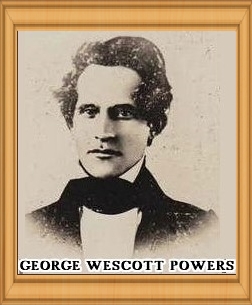
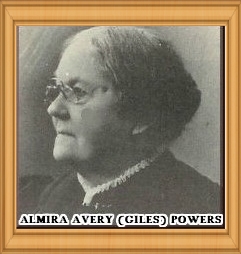
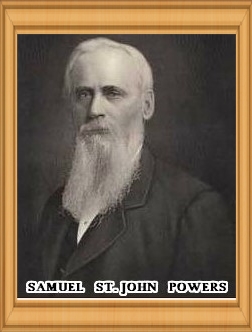
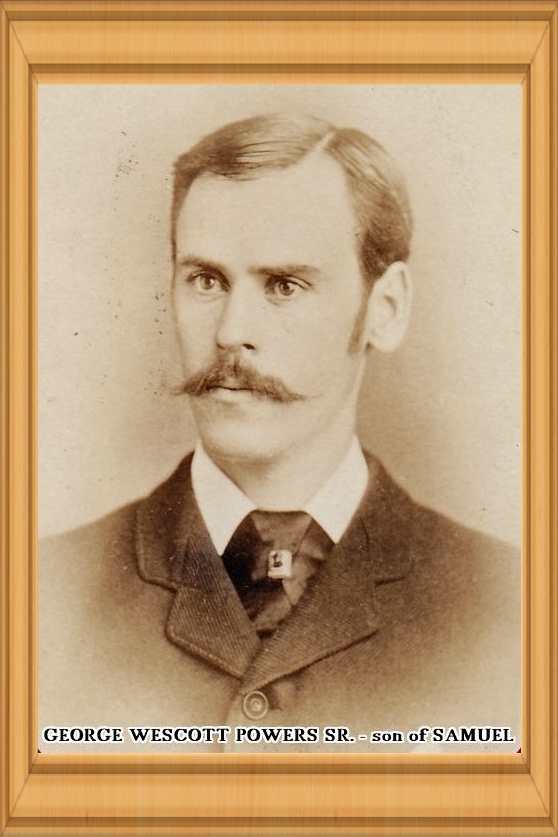
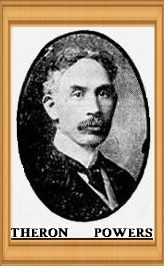
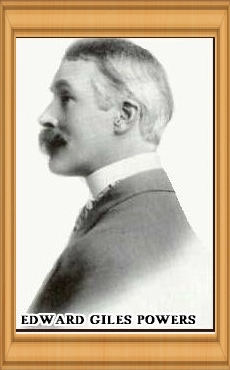
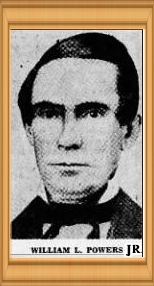
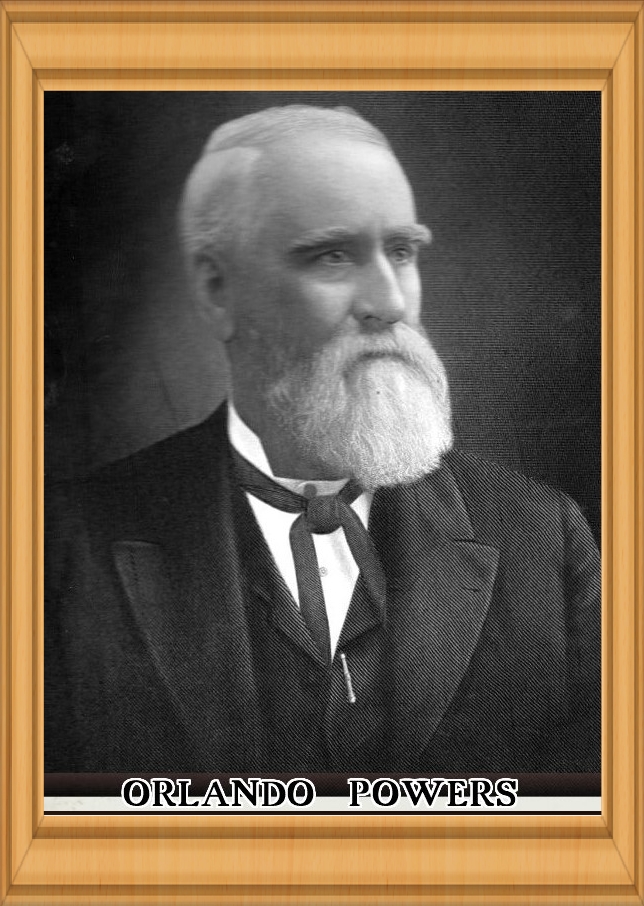
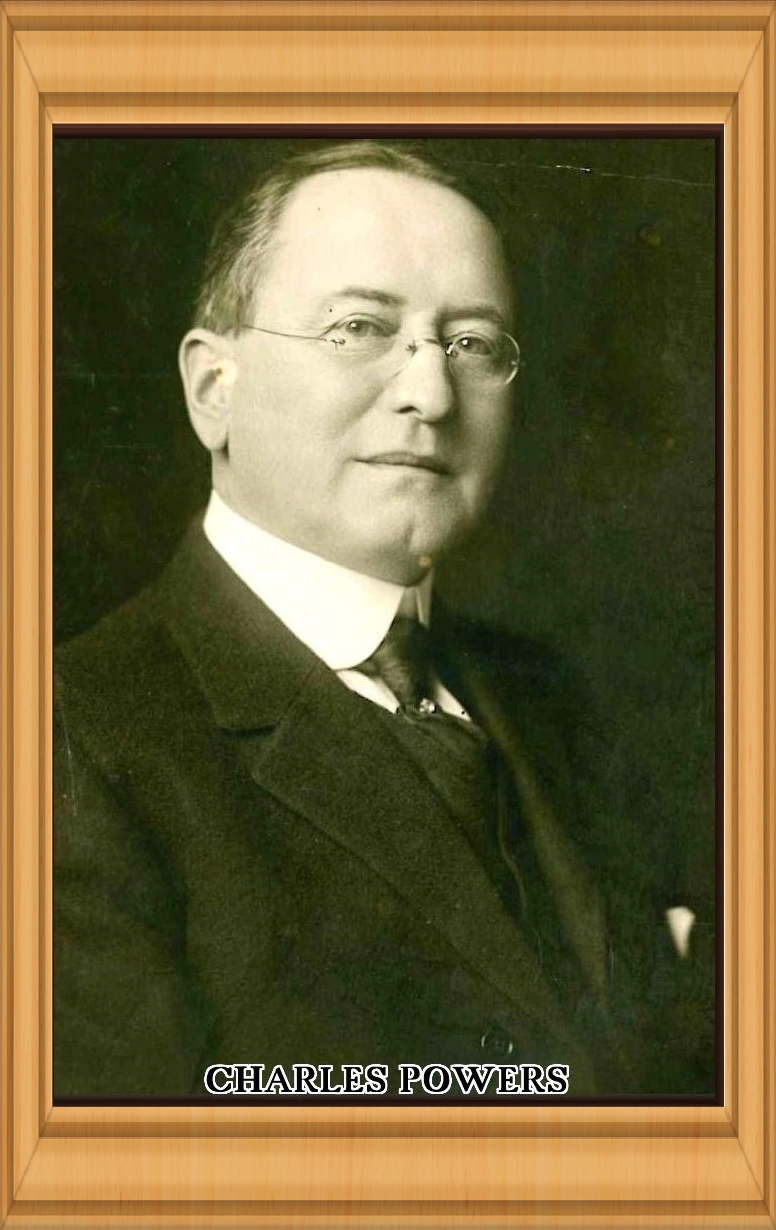
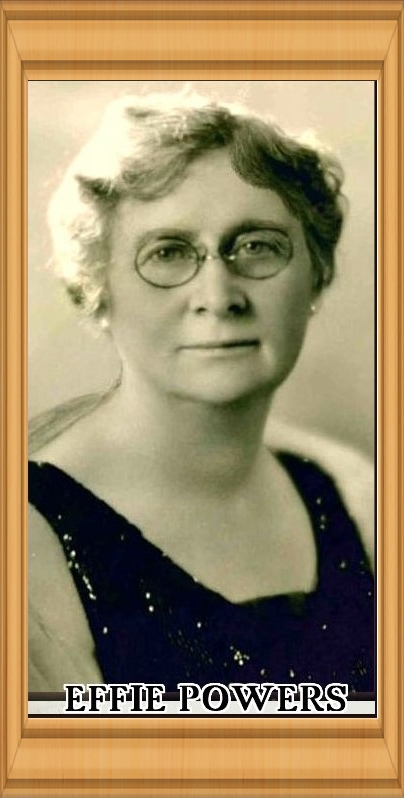
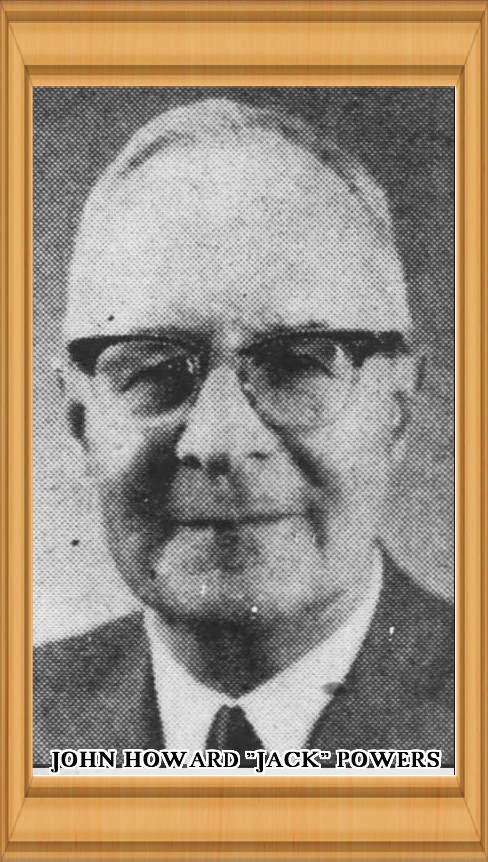
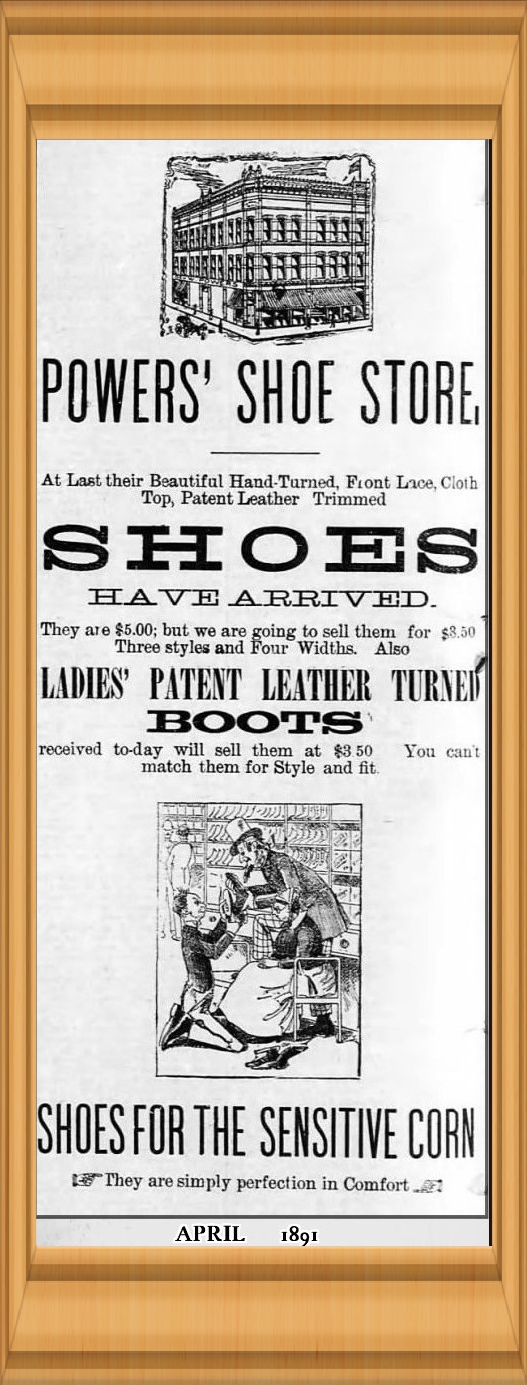
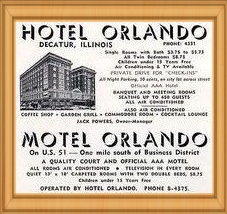
|
William Lorenzo Powers Sr. (born 1783), had been in the boot and shoe business as a young man in Bridgeport, Connecticutt. William Lorenzo Powers Sr. and Abigail Hentrix were married in 1803 in New Canaan, Fairfield County, Connecticutt. Their first child, William Lorenzo Powers Jr. was born there in 1804. William decited to take up farming and within the next couple of years they moved near Charlton, Saratoga County, New York. The ramaining children were born here. Lamira in 1807, Chauncey in 1810, Orlando in 1812, George Wescott in 1814, Samuel St. John in 1816, Charles in 1818 and Sarah Ann in 1820. William Powers Sr. died on his farm in a sandbank cave-in on March 8, 1825. After William died, the family sold the farm in Saratoga and moved south, to Alabama, where both George and his brother Orlando began successful businesses. In July 1839, George and Samuel rode into Decatur, which was still in its infancy, with about 3,000 inhabitants. They knew of plans for the railroad to run through the town, and Samuel decided it could become an important stop. The two settled here, with Samuel building a brick house and George starting a mail service. Soon the rest of the family joined George and Samuel, with the oldest of the Powers brothers, William, moving to Bloomington. When the Powers family came to Decatur they brought high society to what was then barely more than a mud hole. The Powers were true American aristocrats - New England colonists and Revolutionary War heroes. Andrew Powers, father of William Lorenzo Powers Sr. fought in the war. Soon there weren't many enterprises the Powers weren't involved in. Samuel invested in livestock and became known worldwide for horse breeding - he owned Billet, one of the most sought-after studs in the world of horses. George was elected to the Illinois legislature in 1844 and became the second attorney admitted to the bar in Macon County. Charles Powers, son of Orlando Powers, was instrumental in building both the Orlando Hotel and Powers Mansion. William, who never actually lived in Decatur, was the first Powers to start building commercially. After purchasing farmland in rural Macon and McClean counties, in 1856 he turned his attention to the city, constructing a group of buildings in what became known as Powers Block - the south side of 100 block of East Main. Among those buildings was Powers Hall, which housed Decatur's first auditorium. But it was Orlando Powers who became the most individually significant Powers in Decatur. After surviving a shipwreck at age 16 during which he floated 11 days at sea in the Atlantic Ocean, Orlando settled in Decatur his wife, Charlotte. In 1849, he began a milling business and later opened a general store. By 1878, he'd amassed enough money to help save the Millikin bank, and Slider said Orlando helped Decatur establish a sewer system in the downtown area by selling some land in the hollow just below Greenwood Cemetery to the city. But it was in 1889 that Powers made his most significant contribution - the Powers Grand Opera House.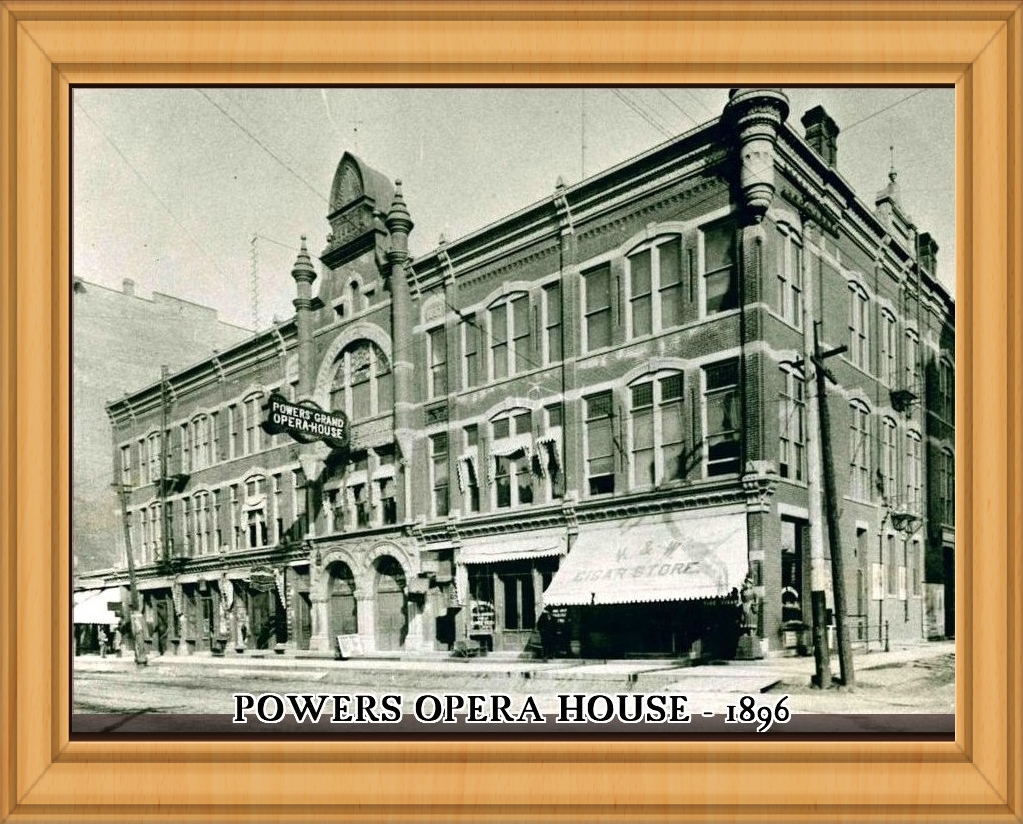 The opera house On the corner of South Water and Wood, the Powers Grand Opera House opened on Sept. 9, 1889. According to Dayle Cochran Irwin's book, "Decatur Entertainment: A Pictorial History," the Powers Opera House, "rivaled Chicago in entertainment and accoutrements." The front entrance was Bedford stone, St. Louis pressed brick and ornamented terra cotta in the Romanesque style. The lobby was decorated with imported French tile. But six years after it was built, the Powers Opera House burned down. Orlando had it immediately rebuilt. The second one was as impressive as the first, hosting all the big stars of the early 20th century. According to the Jan. 2, 1915, Decatur Herald, the opera house was known in theatrical circles as one of the most complete theaters in the country and had a large enough stage for any Metropolitan productions. On the morning of April 7, 1914, one of the largest fires in Decatur history took out the entire Powers Block, including the second opera house. In the Decatur Herald, it said: "In a few short hours, the handsomest block in central Illinois was in ashes." The Decatur Fire Department determined the cause was arson, but the perpetrator was never found. "That opera house was very popular," said former Millikin history professor Dan Guillory. "It was the cultural hub in Decatur. When it burned down, it was a big deal to the local psyche." By then, Orlando had died; he passed in 1902 at age 90. But the Powers family almost immediately began building again. But it was the next year that the Powers family, specifically Orlando's son Charles, added another chapter to the Powers legacy. Instead of building another opera house on the corner of Water and Wood, Charles built Decatur's most opulent hotel - it was considered fireproof. Named after Orlando Powers, the hotel opened on Feb. 18, 1916, with a gala benefiting the Decatur and Macon County Hospital (now Decatur Memorial Hospital) attended by more than 700 people. It was a six-story structure that also housed Linn & Scruggs Department Store. The opera house On the corner of South Water and Wood, the Powers Grand Opera House opened on Sept. 9, 1889. According to Dayle Cochran Irwin's book, "Decatur Entertainment: A Pictorial History," the Powers Opera House, "rivaled Chicago in entertainment and accoutrements." The front entrance was Bedford stone, St. Louis pressed brick and ornamented terra cotta in the Romanesque style. The lobby was decorated with imported French tile. But six years after it was built, the Powers Opera House burned down. Orlando had it immediately rebuilt. The second one was as impressive as the first, hosting all the big stars of the early 20th century. According to the Jan. 2, 1915, Decatur Herald, the opera house was known in theatrical circles as one of the most complete theaters in the country and had a large enough stage for any Metropolitan productions. On the morning of April 7, 1914, one of the largest fires in Decatur history took out the entire Powers Block, including the second opera house. In the Decatur Herald, it said: "In a few short hours, the handsomest block in central Illinois was in ashes." The Decatur Fire Department determined the cause was arson, but the perpetrator was never found. "That opera house was very popular," said former Millikin history professor Dan Guillory. "It was the cultural hub in Decatur. When it burned down, it was a big deal to the local psyche." By then, Orlando had died; he passed in 1902 at age 90. But the Powers family almost immediately began building again. But it was the next year that the Powers family, specifically Orlando's son Charles, added another chapter to the Powers legacy. Instead of building another opera house on the corner of Water and Wood, Charles built Decatur's most opulent hotel - it was considered fireproof. Named after Orlando Powers, the hotel opened on Feb. 18, 1916, with a gala benefiting the Decatur and Macon County Hospital (now Decatur Memorial Hospital) attended by more than 700 people. It was a six-story structure that also housed Linn & Scruggs Department Store.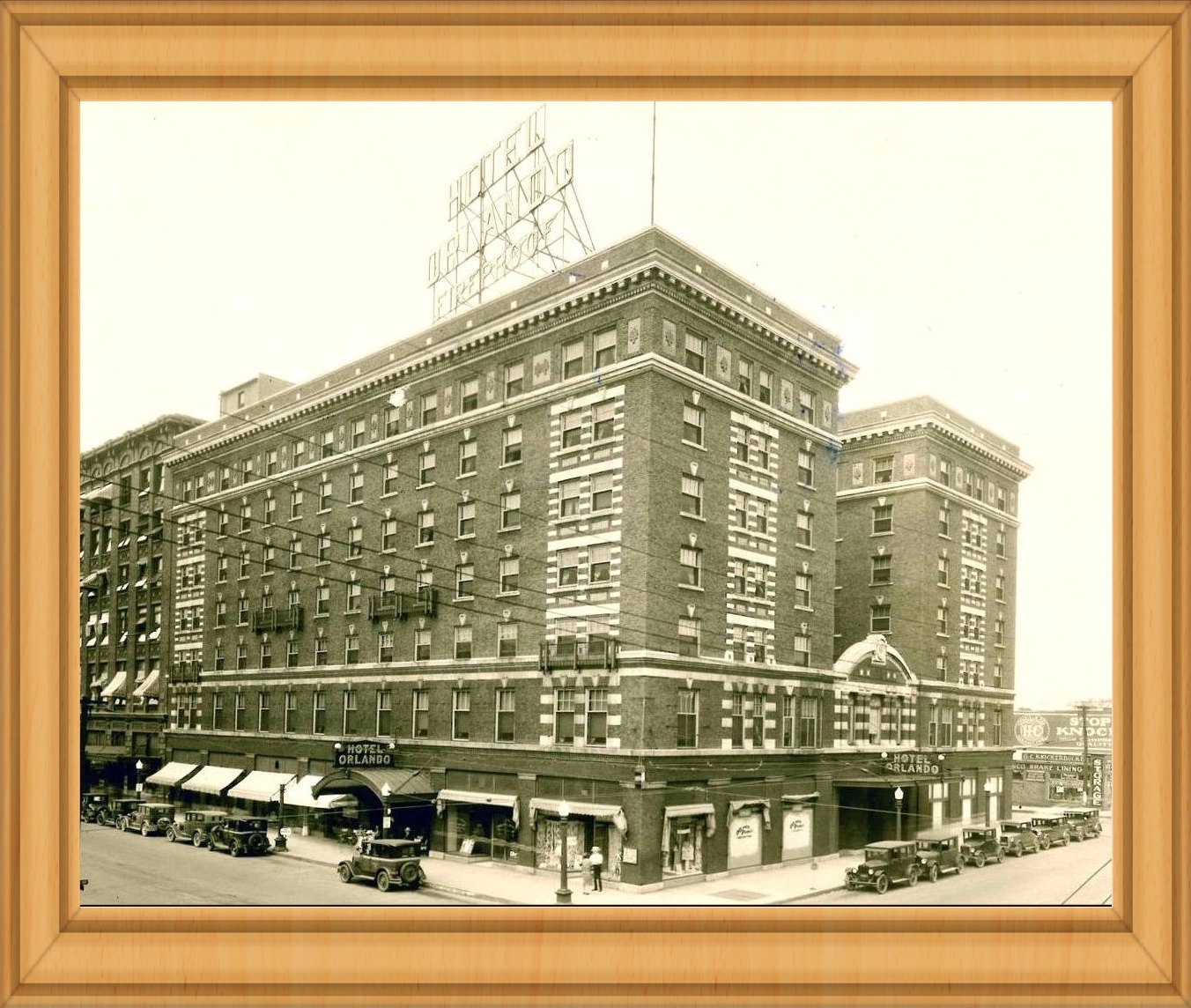 The Decatur Herald from Feb. 18, 1916, listed what every woman in attendance wore, from Mrs. Charles Powers' tulle over rose dress with a bodice combined of rose, silver lace and iridescents, to Mrs. A.E. Staley's black jet over chiffon. The crowd danced on the second floor ballroom and got the chance to take a tour of the rooms, including what the Decatur Herald described as the "famed parlor suite in the southwest corner." Finishes in all the rooms and the furniture were mahogany - a favorite of the Powers family - and the office and lobby were trimmed in black walnut with a baseboard of green marble. The Decatur Herald from Feb. 18, 1916, listed what every woman in attendance wore, from Mrs. Charles Powers' tulle over rose dress with a bodice combined of rose, silver lace and iridescents, to Mrs. A.E. Staley's black jet over chiffon. The crowd danced on the second floor ballroom and got the chance to take a tour of the rooms, including what the Decatur Herald described as the "famed parlor suite in the southwest corner." Finishes in all the rooms and the furniture were mahogany - a favorite of the Powers family - and the office and lobby were trimmed in black walnut with a baseboard of green marble. 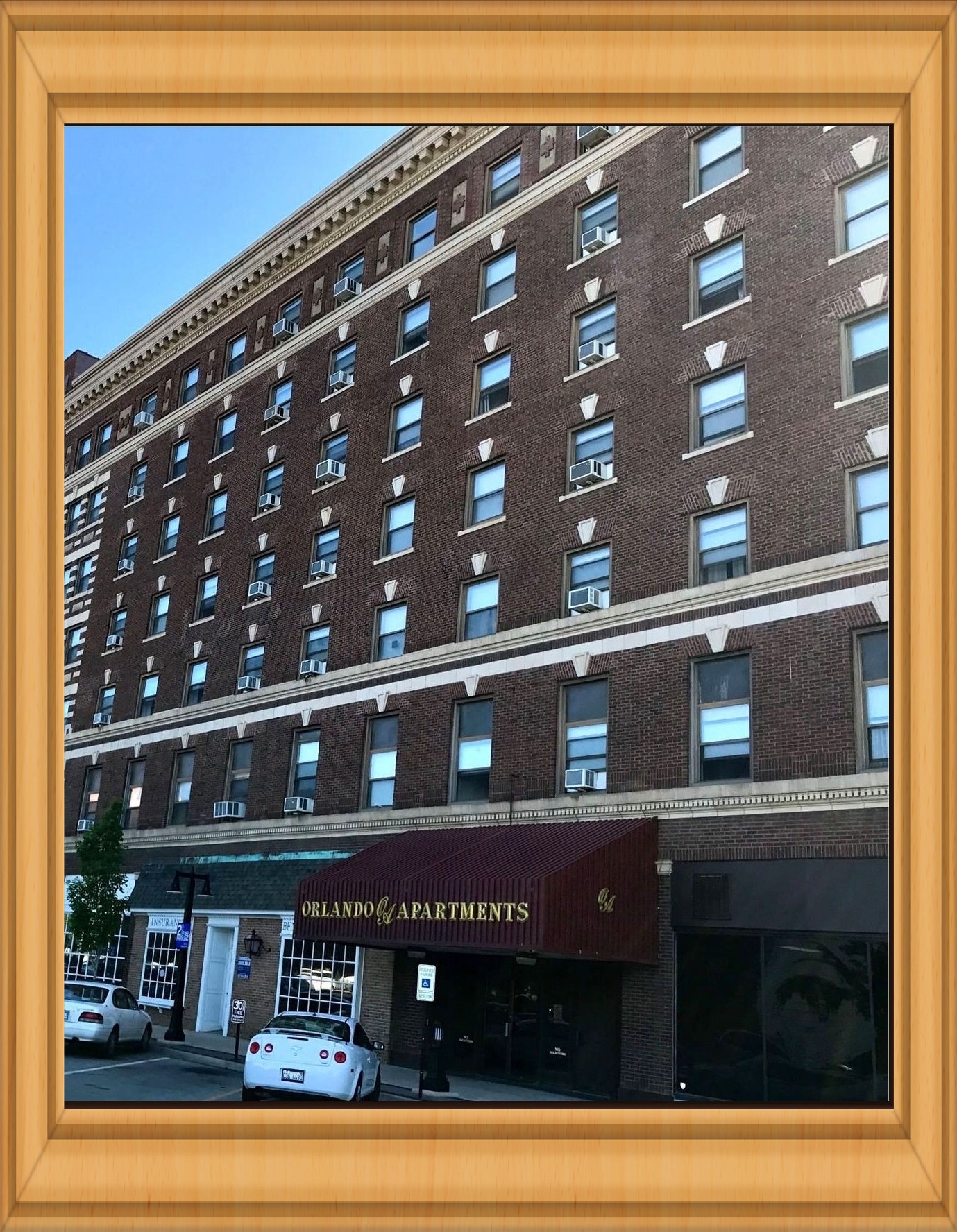 Three hydraulic elevators served 200 rooms. A favorite spot within the hotel was the Commodore Room, which is where, according to a story by Don Brilley in the Feb. 6, 1977, Decatur Herald was where the "serious drinking occurred." In 1952, Charles Powers' son Jack commissioned Decatur artist Royce Caron to paint an 8-by-10-foot mural of Stephen Decatur on the deck of the warship USS Intrepid off the coast of France in 1804. In 1959, the Commodore Room featured a lobster tank in which 100 live lobsters flown in from Maine. Today, the Hotel Orlando still stands in downtown Decatur. There were a long succession of owners through the years, but eventually the hotel came back to Jack Powers in 1971, and the hotel rooms were redesigned as efficiency apartments. For nearly 30 years, the apartment building - the largest in Decatur - has been senior housing, with several businesses also operating out of the building. Just a few years before building the Orlando Hotel, Charles Powers built what Guillory said was "the most sumptuous personal residence ever built in Decatur, by any measure."The 13-room, three-story home, located at 357 W. Decatur St., was built in 1910 for $83,000. According to what Guillory said is a conservative estimate, that translates to $2 million today. "And if you tried to rebuild that mansion today, with the materials they used, it would cost considerably more," Guillory said. Three hydraulic elevators served 200 rooms. A favorite spot within the hotel was the Commodore Room, which is where, according to a story by Don Brilley in the Feb. 6, 1977, Decatur Herald was where the "serious drinking occurred." In 1952, Charles Powers' son Jack commissioned Decatur artist Royce Caron to paint an 8-by-10-foot mural of Stephen Decatur on the deck of the warship USS Intrepid off the coast of France in 1804. In 1959, the Commodore Room featured a lobster tank in which 100 live lobsters flown in from Maine. Today, the Hotel Orlando still stands in downtown Decatur. There were a long succession of owners through the years, but eventually the hotel came back to Jack Powers in 1971, and the hotel rooms were redesigned as efficiency apartments. For nearly 30 years, the apartment building - the largest in Decatur - has been senior housing, with several businesses also operating out of the building. Just a few years before building the Orlando Hotel, Charles Powers built what Guillory said was "the most sumptuous personal residence ever built in Decatur, by any measure."The 13-room, three-story home, located at 357 W. Decatur St., was built in 1910 for $83,000. According to what Guillory said is a conservative estimate, that translates to $2 million today. "And if you tried to rebuild that mansion today, with the materials they used, it would cost considerably more," Guillory said.

Those materials included a special cream-colored brick, copper on the balconies, which has taken on a green patina over the years, as well as marble, Mediterranean tile on the roof and, of course, mahogany in the interior. The home was 105 feet wide and 60 feet deep. The third floor contained a ballroom, with an elevator later installed. "At the time, the popular style was late Victorian Gothic, but this house doesn't look anything like that," Guillory said. "It was unique, and beautiful any way you cut it. That portico in the front, the porch, those iconic stone columns . it really had more of a Grecian look than Italianate. "It appears to be a grand structure from the outside, but it's somehow still intimate and inviting. To me, that was the real accomplishment of the architect." Effie Powers, the wife of Charles Powers, was an avid golfer and one of the original residents of the Powers Mansion. The mansion has changed hands several times since, with Sam Jarvis owning it for most of the 1940s and '50s, then the Bachrach Clothing company taking it over and restoring it in the 1990s. The home was purchased at an auction in 2005 by Anthony Garson.
It was auctioned June 20, 2017.
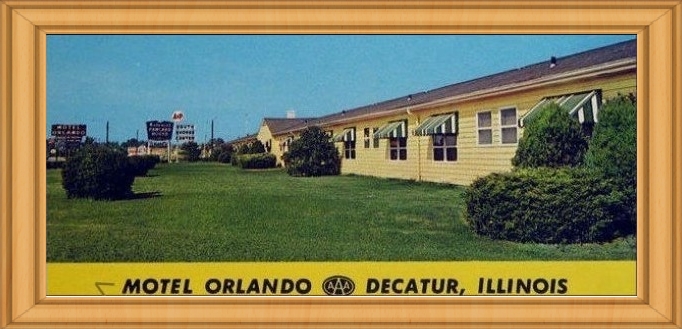
Long since gone - The Orlando Motel stood in South Shores off of U.S. 51 before much of the area was developed. The motel opened on August 13, 1953 and was operated by John Howard "Jack" Powers. There were 32 units. The Wharf restaurant, (still open in 2023), stood just east of the Orlando. The motel did remodeling and upgrades in 1965. By 1972 more hotels were being built in Decatur and they could not compete. The Orlando motel closed July 31, 1972. |
|
While much of what the Powers built is gone, their imprint remains. In the Decatur Herald on Aug. 14, 1968, Glen Cooper wrote that the Powers were a big reason for the large amount of the population from Haywood County in Tennessee - the Brownsville area - had come to Decatur. "Decatur residents who are familiar with the history of the Powers family said several of the employees in the old Powers home were residents of Brownsville and were brought here by the Powers," Cooper wrote. Cooper wrote that George and Samuel Powers moved to Decatur to invest in land, acquiring government land patents from veterans of the Mexican War, who were given land at the time they were discharged. Much of one of those tracts acquired by the Powers family - 160 acres bounded on the west by Oakland, on the north by Wood, on the east by Main Street, and on the south by the Sangamon River - was settled by Brownsville residents. But Guillory said the family should be remembered less for their commercial endeavors and more for their contributions to Decatur culture. "There are some major families who make up the pillars of any community," Guillory said. "In Decatur's case, that would include A.E. Staley, James Millikin, Hieronymus Mueller, and Dr. Will Barnes. But you have to put the Powers family in there. And culturally speaking, they led the pack." According to Irwin, the Powers even brought golf to Decatur. Charles Powers and his wife, Effie, were both avid golfers and introduced the game to Decatur in 1897 after spending a long winter vacation in Palm Beach, Fla. "The couple had purchased a set of golf clubs, and Powers invited a group of friends to accompany him to the Haworth farm near Stevens Creek on the south side of Main Street so he could try out the clubs and boast a bit in the process," Irwin wrote. The Powers family name appears on three Decatur streets and in 14 additions, subdivisions and other platted areas. Included is an Orlando Powers Addition to Greenwood cemetery in 1878. The three streets are Powers Lane, Powers Lane Place and Powers Boulevard.
|
|
|